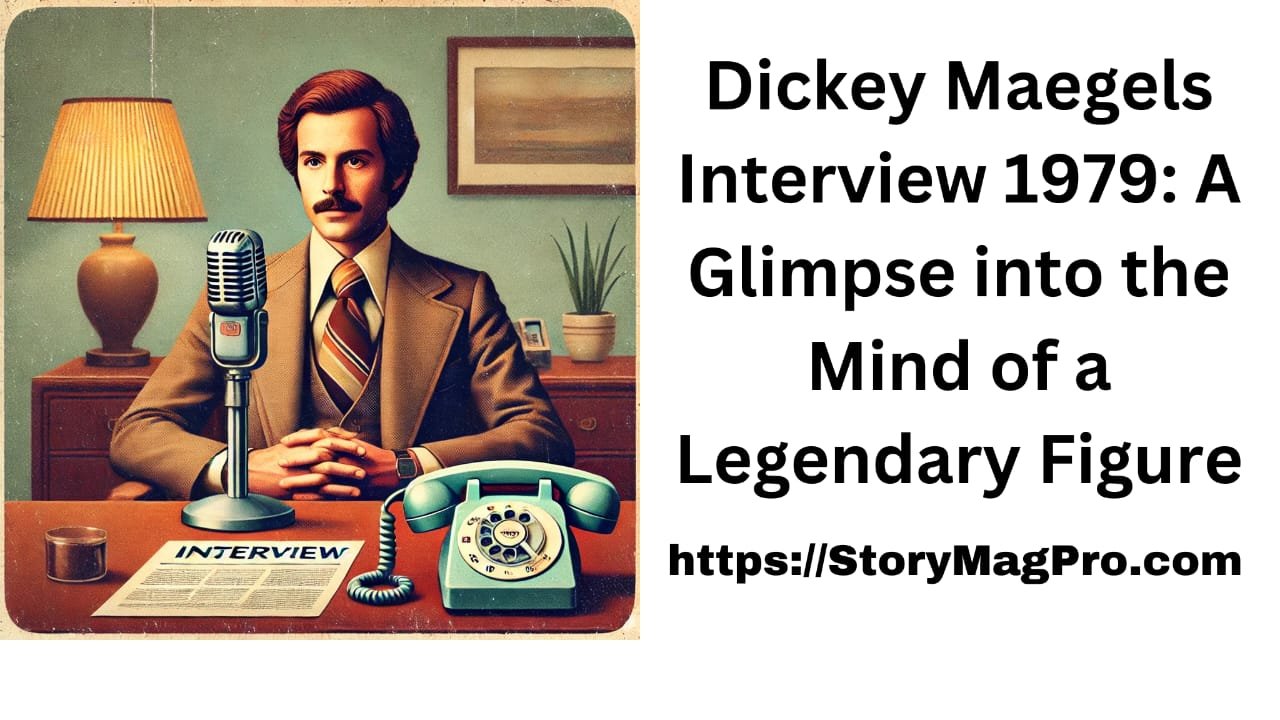
Introduction
In the world of business and entrepreneurship, few names stand as tall as Dickey Maegels Interview 1979, whose amazing career and inventive ideas have left an everlasting impression on the industry. Maegels, a visionary entrepreneur and business giant, was most recognized for his transformational approach to marketing, branding, and corporate strategy. While his accomplishments are generally evaluated in terms of their influence on the economic world, one of the most revealing windows into his psyche was his 1979 interview. The interview, done at a key point in Maegels’ career, afforded a unique chance to comprehend the ideas that influenced his actions and the problems he experienced along his journey.
In this essay, we go into the essential elements of the 1979 interview with Dickey Maegels, covering the topics of innovation, leadership, and the business environment as viewed through his eyes. This interview not only offered the audience an appreciation of his financial acumen but also provided insights into the complicated and shifting environment of the 1970s.
Setting the Stage: The Context of 1979
By 1979, Dickey Maegels had already become a prominent person in the business sector. At the time of the interview, Maegels was running a firm at the forefront of marketing innovation and had played a big influence in changing customer interaction methods. The late 1970s were a period of substantial economic and cultural transformation, typified by increased global competitiveness, technical developments, and a fast evolving consumer environment. This time provided unusual problems for corporate executives, and Maegels’ reaction to these issues was of significant interest to those following the sector.
The interview, published in a renowned business journal of the day, tried to dive further into the personal and professional beliefs of Maegels as he navigated these stormy seas. The questions included everything from his vision of future markets to his ideas on the growing role of corporate responsibility in a changing society.
Key Themes from the Interview
1. Innovation as the Core of Business Strategy
One of the most remarkable features of the conversation was Maegels’ focus on innovation. For him, success was not only about understanding current markets but about always pushing the envelope to generate new possibilities. In his words, “The secret to longevity in company is to continually remain ahead of the curve. If you’re not innovating, you’re stagnating.”
Maegels was fully aware that the market was shifting fast. The advent of new technologies, particularly in the field of communication and media, meant that companies had to discover unique methods to reach and engage their consumers. He talked at length on his commitment to understanding new trends and implementing them into his company’s strategy. His forward-thinking approach, he added, was anchored on a profound grasp of consumer psychology and the need to produce goods that resonated on an emotional level with people.
2. The Role of Leadership
Throughout the conversation, Maegels stressed his thoughts on leadership, notably his concept that great leaders are those who can inspire innovation and nurture cooperation. He defined his leadership style as “democratic but decisive,” stating that he respected feedback from all levels of his business. “It’s not about dictating what people do; it’s about creating an environment. Where they can be free to contribute their best ideas,” Maegels added. He also underlined the significance of being adaptive in the face of adversities. In the ever-changing world of business, inflexible leadership styles were, in his opinion, a formula for failure.
Maegels’ approach to leadership was a break from the authoritarian model that dominated most of corporate culture at the time. His focus on employee empowerment and cross-functional teamwork created the framework for a more contemporary concept of corporate leadership.
3. The Impact of Social and Economic Forces
Another important aspect in the discussion was Maegels’ awareness of the larger social and economic forces that were impacting company practices. The 1970s had been defined by enormous economic issues. Including inflation and energy crises, and Maegels pondered on how these events influenced corporate operations. He suggested that, despite these impediments, firms may prosper by being adaptable and sensitive to changing situations.
Interestingly, Maegels also emphasized the role of corporations in addressing social responsibility. At the time, the notion of corporate social responsibility (CSR) was only in its infancy, but Maegels was ahead of the curve. He thought that corporations had a responsibility not merely to their shareholders but also to their workers, customers, and communities. He talked on the necessity for firms to act with a sense of ethical responsibility. Especially in view of increased public awareness of environmental challenges.
4. Looking to the Future Dickey Maegels Interview 1979
When questioned about the future of business and where he sees the industry headed, Maegels was cautious but enthusiastic. He predicted that the following decade would bring significant technical advancements, and that firms who could adapt to these changes would be the ones to prosper. He also projected a rising movement towards global markets. With corporations having to look beyond national lines in order to stay competitive.
Maegels projected that technology will become increasingly more interwoven into corporate processes. Especially in areas like marketing, manufacturing, and customer service. He stated, “The businesses that will thrive in the coming decades will be those that learn to use. Technology not just for efficiency, but for creating deeper, more personal connections with customers.”
The Legacy of the Dickey Maegels Interview 1979
Dickey Maegels’ interview in 1979 was a crucial milestone in corporate debate. His thoughts give a significant insight on the developing nature of corporate strategy at a period of tremendous turmoil. His focus on innovation, leadership, and social responsibility. Resonated not only with business professionals at the time but continues to impact current business practices.
Looking back, Maegels’ views were prescient. Many of the themes he identified—such as the rising significance of technology in business and the need for socially. Responsible practices—would become defining elements of the following few decades of corporate growth. For anybody interested in the growth of corporate. Strategy and leadership, the 1979 interview with Dickey Maegels remains a significant source of knowledge and vision.
Conclusion about Dickey Maegels Interview 1979
Dickey Maegels’ 1979 interview gives an intriguing look into the thinking of a corporate visionary during a changing moment. His insights on innovation, leadership, and social responsibility have continued to affect the corporate world. Through this conversation, Maegels not only conveyed his thoughts on what it required to succeed. Business but also presented a wider vision for a more dynamic and ethical corporate world, one that continues to inspire future generations of entrepreneurs and leaders.




1 thought on “Dickey Maegels Interview 1979: A Glimpse into the Mind of a Legendary Figure”